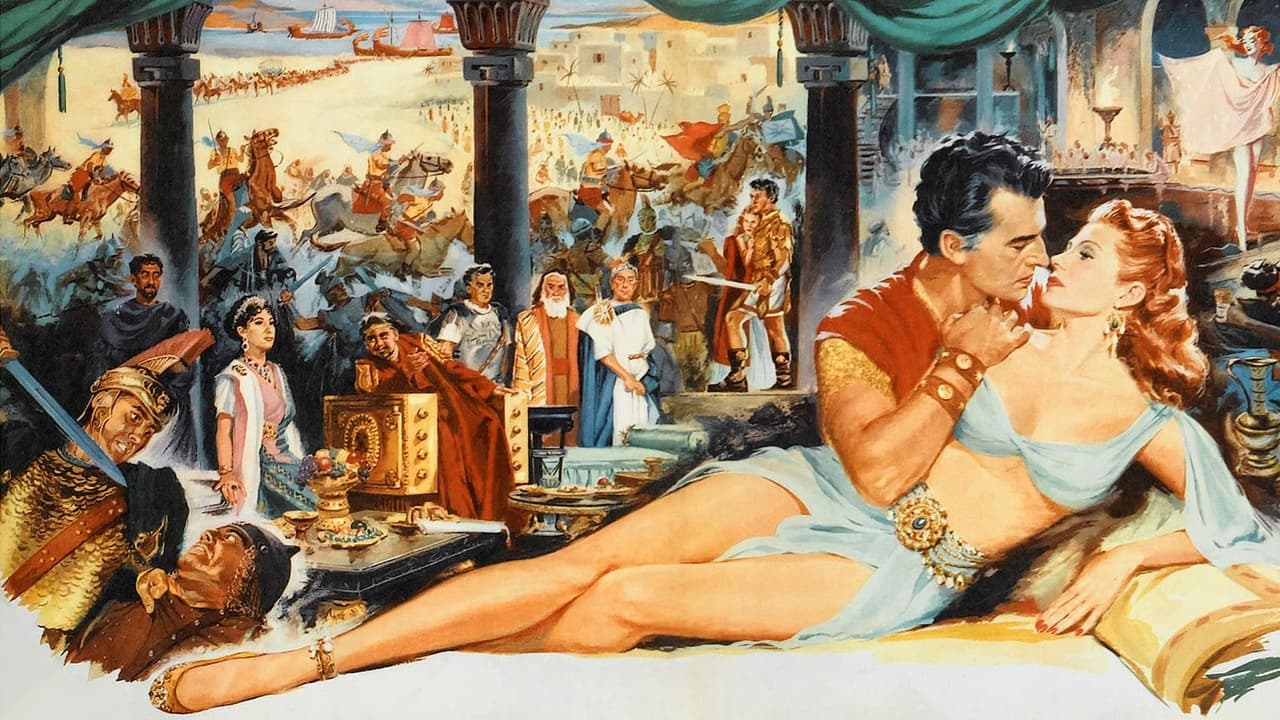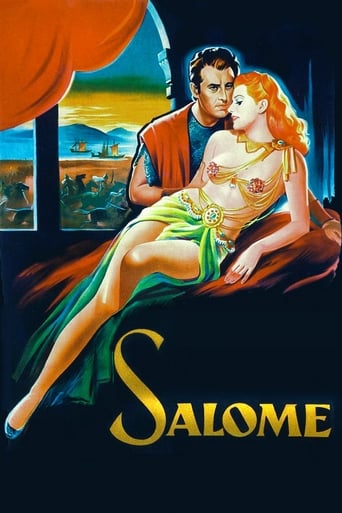



Wow! Such a good movie.
Slow pace in the most part of the movie.
It is not only a funny movie, but it allows a great amount of joy for anyone who watches it.
View MoreThere is just so much movie here. For some it may be too much. But in the same secretly sarcastic way most telemarketers say the phrase, the title of this one is particularly apt.
View Morethe first temptation is to criticize it. very hard. and it is the normal reaction. because the film has potential and the right cast. but for director seems be more seductive the easy way. the dance of Rita Hayworth, the sketch of the force of Charles Laughton, Judith Anderson in a role as game of stereotypes. the result - not the best. after decades, it is not a real sin and it is a wise option to see it as piece from a long chain of religious/historical films from the "50. but the case of "Salome" remains different. for the simple motif than it is not an ordinary film from the "50. and only way to discover it out of not inspired solution of script or director vision is ... to imagine it.
View MoreJohn the Baptist (Alan Badel) denounces the rule of King Herod (Charles Laughton) and the scheming Queen Herodias (Judith Anderson). Herod was her husband's brother. Emperor Tiberius Caesar dismisses Princess Salome (Rita Hayworth) from Rome. She returns home to her mother Herodias with Roman soldier Commander Claudius (Stewart Granger). Herod lusts after her. Salome attends John the Baptist speaking and is taken with him.This is an old-fashion Biblical epic with big sets and old-fashion big acting. The acting is very broad compared to modern sensibilities. The veteran duo of Laughton and Anderson is compelling. Hayworth's acting is rarely subtle. Badel does a lot of staring skyward. Unlike some of the more iconic Biblical epics, this one doesn't have the big action scenes unless the Dance of the Seven Veils is an action scene to you. Rita Hayworth throws everything into the dance. Maybe she's throwing too much into it. Some of the moves are too hard and not sensual enough. I like some of the old epics but this is not one of them.
View MoreQuite a complicated and interesting drama, based on the well known, but previously much altered and embellished brief biblical story of Salome(unnamed in the bible): daughter of Herodias and stepdaughter of Herod Antipas: ruler of Galilee, and the involvement of these 3 in the dramatic serving of John the Baptist's head at a lavish birthday banquet hosted by Herod.In this version, we have two scorned women in Salome(Rita Hayworth) and Herodias(Judith Anderson). These events occur early in the film. First, there is a report that the Jewish prophet John the Baptist has returned from the wilderness. He has been criticizing the (clearly loveless) marriage of Herodias and Herod as defying Jewish law, Herodias being the former wife of Herod's brother, who is Salome's biological father. Herodias petitions Herod(Charles Laughton) to have this busybody crank put to death. But Herod fears he may be the rumored messiah, and that his death by his edict might cause bad things to happen and the common people to riot against him. Fortunately, for Herod, John has also been preaching things treasonous to Rome. Thus, he has other pretexts to jail, if not execute, him. This doesn't happen until late in the story. Meanwhile, in a completely novel embellishment of the story, we find Salome having lived in Rome most of her life, as a spoiled princess. Now, Marcellus, cousin of the emperor asks permission to marry her. The emperor refuses, because Salome is not of royal Roman blood. Furthermore, he banishes her back to Galilee, charged with being a barbarian and woman of ill-repute. After failing to convince Marcellus to renounce his Roman citizenship, she boards a ship also carrying the newly appointed governor of neighboring Judea: an unimpressive Pontius Pilot(P.P.). Also prominent is P.P.'s new commander of the occupying army: impressive Claudius(Stewart Granger), who has 5 years diplomatic experience in Galilee, and is a friend of John the Baptist(however unlikely!), as well as a previous comrade in battle with P.P. They talk about their old times fighting the Britains(which historically didn't happen until several decades later!). P.P. tells Claudius to get Salome out of his quarters on the ship. But Claudius is cowed by her tongue lashing about all Romans, whom she doesn't want to see or speak to for the rest of the journey. But, later he surprisingly steals a kiss when she asks for water for a bath, and continues to confidently tease her arrogance during their overland journey to Galilee.During this journey, John and followers are encountered. Alan Badel, as John, is presented as an upward-gazing mystic, looking like a popular painting of Christ, with piercing blue eyes, in marked contrast to the clean-shaven Romans. But John refuses to heed Claudius's advice not to preach in the cities, nor bad mouth the Romans. Hence, John is later arrested. His riveting exchanges with Herod and his council is one of the highlights of the film. He disclaims being the Messiah, but says he is loyal to an unseen God mightier than any earthly king. Herod has prearranged with Salome to jail John, rather than put him to death, as his ministers, Herodias, and P.P. wish.Meanwhile, Claudius has gone to see P.P. to try to convince him to support, rather than persecute, what Claudius sees as an emerging new religion that will bring peace and prosperity to the Roman world. Suggests P.P. may become famous(rather than infamous) by doing so. But, P.P. disagrees, ordering Claudius to stay out of Galilee until he can be deported back to Rome. P.P. happens to mention a carpenter in his realm, who is claimed to perform miracles. Claudius goes looking for him and witnesses some of his miracles. Disobeying P.P., he returns to visit John and Salome in John's cell, to tell them about Jesus, whom John claims is the messiah.Claudius and Salome then scheme to release John. Claudius is head of the palace guard, so tells them to release John. But Salome says she will dance at Herod's banquet that evening, and ask for John's release. Salome does the 'dance of the 7 veils'. But, strangely, Herod does what Herodias, not Salome, asks! Apparently, Herod agreed to her request for John's head, with the understanding that she then agreed to his attempted seduction of Salome! After wrestling John away from Claudius, Herod's soldiers behead John and deliver it on a platter. I can still hear Rita scream! The film ends with Claudius and Rita attending Christ's Sermon on the Mount. Thus, they symbolize the beginning of the eventual conversion of most of the Roman world to this new religion.I thought Stewart Granger did an excellent job in his unlikely role as the first important Roman to embrace this new religion, dragging Salome along. This theme would be revisited, more dramatically, the following year, in "The Robe". Laughton also did an excellent job as the severely conflicted Herod, as intent on seducing Salome as in preserving the life of John, with ultimate failure on both counts. Rita is also interesting as an unconventional over-aged seductive version of the traditionally teen Salome, with a mind of her own and care about her virtue. Judith's Herodias is to be pitied as the virtually discarded wife of Herod, transferring much of her anger to John.
View MoreAs we all know that Princess Salome,(Rita Hayworth) danced for King Herod,(Charles Laughton) in order to gain his favor and requested that John the Baptist's head would be removed and placed on a silver platter and given to the king. However, Hollywood changed the Bible version and made Salome look like a kind and loving Princess who loved the Christian way of thinking and living and wanted to save John The Baptist from being killed. Stewart Granger,(Commander Claudis) soon become the lover of Princess Salome after she had fought with him constantly and told him she wanted nothing to do with a Roman. King Herod and Queen Herodus (Judith Anderson)was living in adultery since she was married to another man and living with King Herod. Rita Hayworth was an experienced dancer and this was one of her best films in 1953.
View More